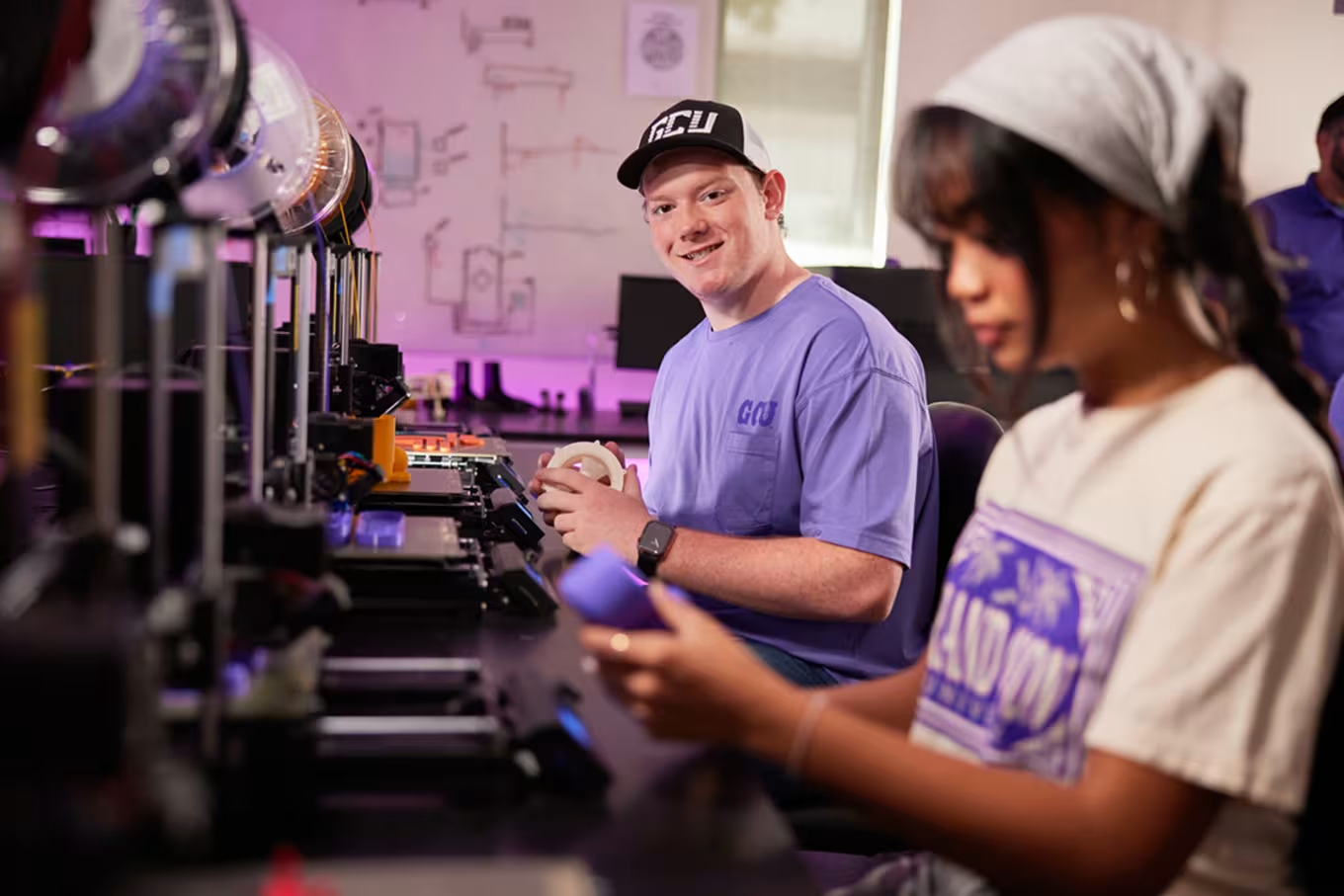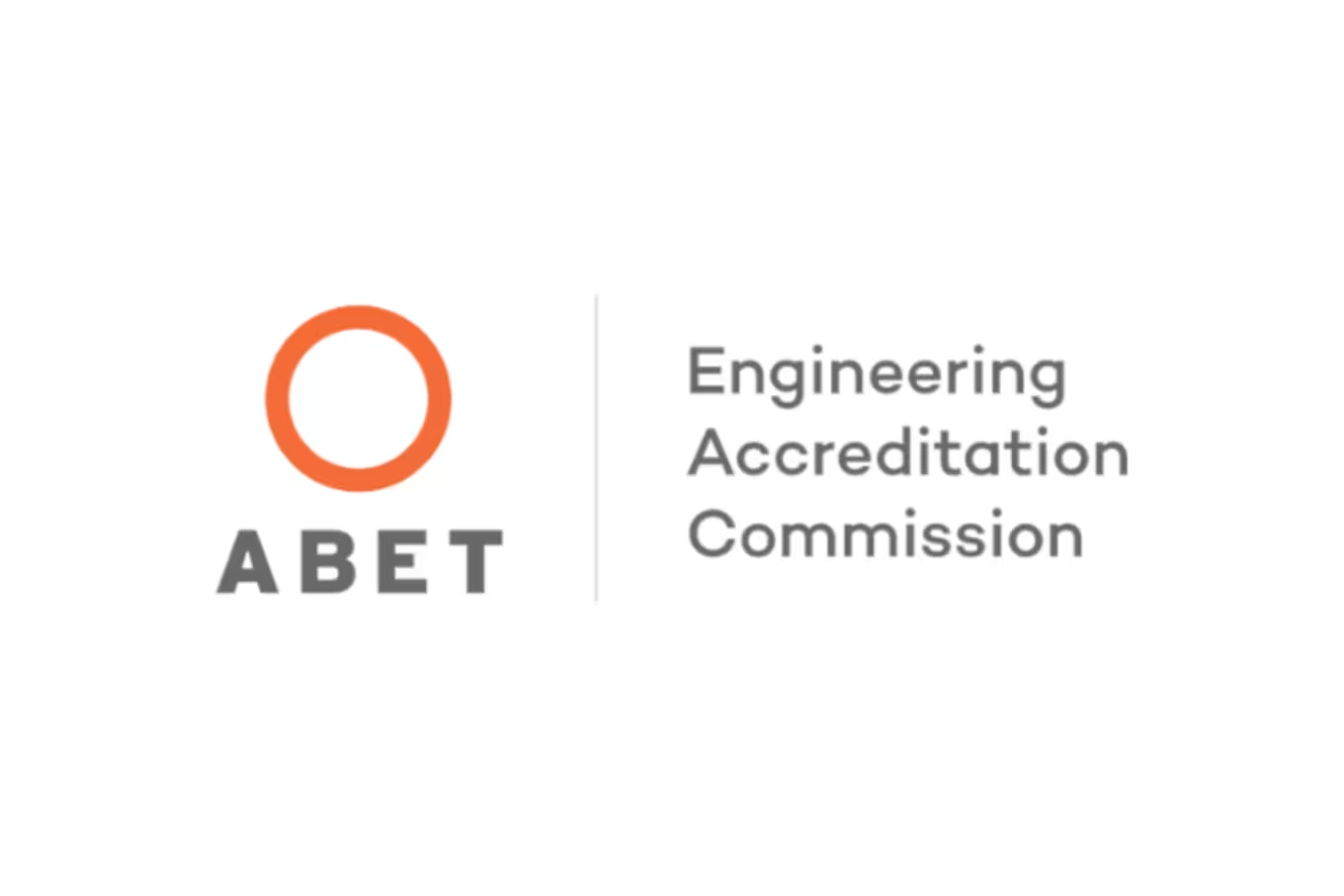
Bachelor’s in Engineering: Project Management Emphasis
journey today.
The Bachelor of Science in Engineering with an Emphasis in Project Management degree from Grand Canyon University is tailored for aspiring engineers seeking to blend technical expertise with project management skills. Offered by the College of Engineering and Technology, this program covers essential engineering principles and project management methodologies.

For STEM-minded students who also have an interest in leadership and management, this program teaches you to confidently tackle modern challenges in engineering from both a technical standpoint and a leadership model. A combination of instructional coursework, hands-on lab experiences and intensive applied research projects forms the basis of this degree.
Ideal for careers in project management, design engineering, manufacturing engineering and engineering sales, graduates will be taught critical thinking, problem-solving and practical experience. This degree equips you to lead projects and drive innovation, preparing you for impactful roles in the engineering field.
Engineering project management can be an exciting and rapidly evolving field that brings engineering projects to fruition through their life cycle. Professionals with a background in project management in engineering are needed as businesses and organizations seek to improve efficiency, reduce costs and increase productivity.1
As a private Christian university, GCU offers faith-integrated courses that empower and encourage graduates to positively impact their communities. The BS in Engineering: project management emphasis incorporates Christian principles of stewardship and discipline, preparing you for effective communication and collaboration in diverse teams and leadership roles
Immerse yourself in project management for engineers on campus, where you’ll benefit from face-to-face discussions with peers and instructors, as well as hands-on learning in our labs. Enhance your education through skills-focused labs and workshops and consider participating in the Research and Design Program (RDP), which allows students to collaborate with faculty on research projects.
Engineering projects often involve multiple stakeholders, complex technologies and large budgets, making structured management essential. This emphasis teaches you to use project management tools and methodologies to plan, execute and control engineering projects, ensuring timely, budget-friendly and quality outcomes.
As projects drive work processes, the global need for project management highlights its value as a discipline.2 Professionals skilled in technical writing, business presentations and leading engineering teams can anticipate growing opportunities in this field.3
This degree program also covers essential technical tools, including:
Explore System Design and Quality Control Concepts
As future project management in engineering professional, you will be taught leadership and organizational skills applicable across engineering roles. As you progress in this degree program, you will have opportunities to combine your abilities in developing and designing innovative and effective systems. Use a structured approach to plan, execute and control engineering projects to ensure they are completed on time, within budget and to high standards of quality.
The curriculum explores a range of competencies, including:
Project management engineering
Project management and engineering courses can equip you with the tools to plan complex projects, design schedules, manage budgets and balance risks and rewards. You will explore practical management scenarios while reflecting on individual and group behavior, leadership, motivation, decision-making and organizational change.
Design and test engineering
This design and test course can prepare you to apply engineering principles to practical problems using methodologies like Design for Six Sigma (DFSS) and Statistical Process Control (SPC). You will design and test engineering products and systems while integrating quality methodology into business processes.
Manufacturing engineering
Manufacturing engineering courses can empower you to use your skills in a variety of industries by applying advanced principles in designing, planning, operating and controlling production systems. The curriculum emphasizes managerial concepts and strategies for managing operations in both manufacturing and service environments.
Engineering sales
Engineering sales coursework covers economics and both quantitative and qualitative processes to enhance sales techniques. You’ll be taught to identify customer needs, develop technical solutions and communicate complex concepts to non-technical stakeholders. In capstone courses, you will manage project processes by identifying improvements, applying the correct tools and overseeing enhancements.
Prepare to Manage Complex Engineering Projects
This BS in engineering degree with a project management emphasis integrates math, natural sciences and computer programming, focusing on the skills needed to manage complex engineering projects from conception to completion.
You will develop competence in the following areas:
Circuits
Critical thinking
Fluid mechanics
Heat transfer
Materials science
Problem-solving
Solid mechanics
Thermodynamics
Budget and model development
Organizational management concepts and strategies
Practical project management for engineers
With a firm foundation of competencies in both engineering and project management, there may be many different career paths you could pursue, with opportunities in engineering as well as project management fields. You may have the opportunity to apply to roles that allow you to manage engineering projects, construction projects, technical projects and more.
Specific roles may include:
Architectural manager
Engineering manager
Engineer
New jobs estimated for project management specialists from 2023 to 20333
Median annual wage for project management specialists as of May 20234

Potential Industries to Consider
Project management in engineering is becoming increasingly important as many industries face a growing need for innovative professionals who can help manage various business operations and efficiencies.1 While the U.S. Bureau of Labor Statistics (BLS) does not have information specific to engineering project managers, they do estimate job growth for project management specialists to increase by about 7% from 2023 to 2033 — faster than average for all professions — accounting for an estimated increase of 69,900 jobs in the field.3
Industries that rely heavily on engineering projects can benefit greatly from professionals who possess a diverse skill set. This degree program offers you the opportunity to develop hard skills in a variety of areas, potentially preparing you to work in project management industries such as:5,6
The BS in Engineering is accredited by the Engineering Accreditation Commission of ABET, www.abet.org, under the commission’s General Criteria with no applicable program criteria.
GCU has held continuous institutional accreditation by the Higher Learning Commission since 1968. The College of Engineering and Technology shares the university’s commitment to upholding the principles and standards established by our accrediting bodies.

Project Management in Engineering FAQs
Explore answers to frequently asked questions about the bachelor’s in engineering with a project management emphasis. Use this resource to help you make an informed decision for your future.
Yes, engineers can make good project managers because of their strong technical background, analytical skills, problem-solving abilities and communication skills. These engineering traits and skills are crucial for successfully managing complex projects.7,8
Many engineering project managers start their careers as engineers, gaining hands-on experience in a specific technical field before transitioning into project management roles. To become an engineering project manager, a BS in engineering with project management emphasis or a related field is usually the first step. Some pursue advanced degrees, such as our MBA project management emphasis degree or our graduate certificate in project management, which can also help demonstrate your knowledge in project management.9 Ultimately, the qualifications needed to become an engineering project manager will depend on the specific requirements of the role and the industry in which you work.
In engineering, project management specialists are typically charged with overseeing a project through its life cycle — from start to finish. They manage aspects such as the timeline to completion, the budget and the team responsible for executing the project. An engineering project manager must ensure the project gets done on time, within budget, to the required specifications and within all regulatory requirements.
The BLS does not offer salary data for specific types of project management specialists. However, according to the BLS, all types of project management specialists earned a median annual wage of $98,580 as of May 2023.4

Prepare to manage complex engineering projects and lead your team with confidence.
- U.S. Bureau of Labor Statistics. (2024, Aug. 29). Project Management Specialists: Job Outlook. Occupational Outlook Handbook. Retrieved Oct. 18, 2024.
- Project Management Institute (n.d.). What is Project Management? Retrieved Oct. 18, 2024.
- COVID-19 has adversely affected the global economy and data from 2020 and 2023 may be atypical compared to prior years. Accordingly, data shown is effective Aug. 29 2024, which can be found here: U.S. Bureau of Labor Statistics, Occupational Outlook Handbook, Project Management Specialists, retrieved Oct. 18, 2024.
- The earnings referenced were reported by the U.S. Bureau of Labor Statistics (BLS) Project Management Specialists, as of May 2023, retrieved on Oct. 21, 2024. Due to COVID-19, data from 2020 to 2023 may be atypical compared to prior years. BLS calculates the median using salaries of workers nationwide with varying levels of education and experience. It does not reflect the earnings of GCU graduates as project management specialists, nor does it reflect the earnings of workers in one city or region of the country or a typical entry-level salary. Median income is the statistical midpoint for the range of salaries in a specific occupation. It represents what you would earn if you were paid more money than half the workers in an occupation, and less than half the workers in an occupation. It may give you a basis to estimate what you might earn at some point if you enter this career. Grand Canyon University can make no guarantees on individual graduates’ salaries. Your employability will be determined by numerous factors over which GCU has no control, such as the employer the graduate chooses to apply to, the graduate’s experience level, individual characteristics, skills, etc. against a pool of candidates.
- Indeed Editorial Team. (2024, June 27). 9 Common Project Management Industries to Consider. Indeed. Retrieved Oct. 18, 2024.
- Davis, K.D. (2024, Sept. 1). Top 10 Industries Hiring Project Management Professionals. KnowledgeHut. Retrieved Oct. 18, 2024.
- U.S. Bureau of Labor Statistics. (2024, Aug. 29). How To Become an Industrial Engineer. Occupational Outlook Handbook. Retrieved Oct. 18, 2024.
- U.S. Bureau of Labor Statistics. (2024, Aug. 29). How To Become a Project Management Specialist. Occupational Outlook Handbook. Retrieved Oct. 18, 2024.
- Indeed Editorial Team. (2024, June 24). How To Become an Engineering Project Manager (With Skills). Indeed. Retrieved Oct. 18, 2024.


